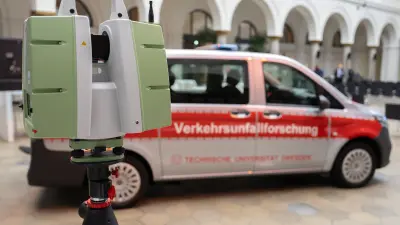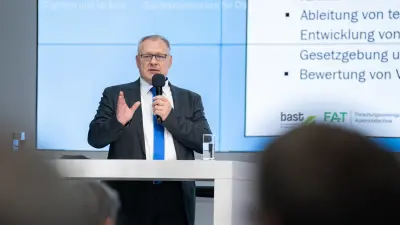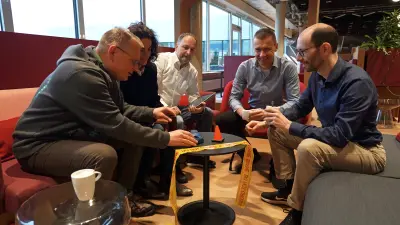25 years of GIDAS: Anniversary event for the future of accident research
The anniversary event in Berlin with German Minister of Transport Volker Wissing and Hildegard Müller, president of the German Association of the Automotive Industry, highlighted the outstanding role of accident investigation for road safety.

Since 1999, a globally unique research project has cataloged more than 48,000 accidents. Bosch Research is involved in the German In-Depth Accident Study (GIDAS) through its membership in the Research Association for Automotive Technology (FAT). For the project, industry partners, together with the German Federal Highway Research Institute (BASt), scientifically investigate accidents with personal injury in Germany. In the 25th year of GIDAS, the project partners from authorities and industry take stock and expand the accident analysis with a variety of new measurement parameters for the GIDAS 4.0 model. On November 5, German Minister of Transport Volker Wissing, president of the German Association of the Automotive Industry Hildegard Müller, as well as representatives from ministries, industry, insurance companies, and consumer protection organizations honored the achievements of this research for the economy and consumers at an anniversary event at the German Ministry of Transport in Berlin, Germany.

GIDAS is considered the international gold standard in the field of in-depth traffic accident research. “Every year, we investigate up to 2,000 accidents in three German regions, collecting up to 3,500 individual pieces of information per event,“ explains Thomas Lich, spokesperson for the FAT working group “Biomechanics and Accident Research,” the research project. Lich is a specialist and overall responsible for accident research at Bosch, on which new safety systems for all types of mobility are based. “The special thing about GIDAS is the collaboration between BASt as an authority and FAT, the industry's research. Automobile manufacturers, testing organizations, and automotive suppliers such as Bosch are members of FAT and support the pre-competitive research project,” explains Lich. “This is unique worldwide.” As a result, authorities and industry have a common database to improve road safety in Germany. This model of detailed data collection has now been successfully introduced by Bosch Research in India, China, Brazil, and Thailand.

The data treasure of the research project is extensive enough to serve as a basis for consumer protection measures and legislation. Bosch Research has been using the data for almost 20 years — among other things, to invent new products for road safety. Prominent examples that have benefited from the GIDAS data include stability control for motorcycles in curves or the anti-lock braking system (ABS) for pedelecs. To be able to answer the research questions of the future, GIDAS 4.0 incorporates new data and topics into the collection. In particular, the areas of electromobility, connectivity, and increasing automation are in focus, but long-term consequences of accidents and traffic psychology will also be given greater consideration in the future. “GIDAS has been continuously improved for 25 years,” says Bosch expert and FAT spokesperson Lich, “but now we are taking a particularly big step forward to make GIDAS future-proof.”

